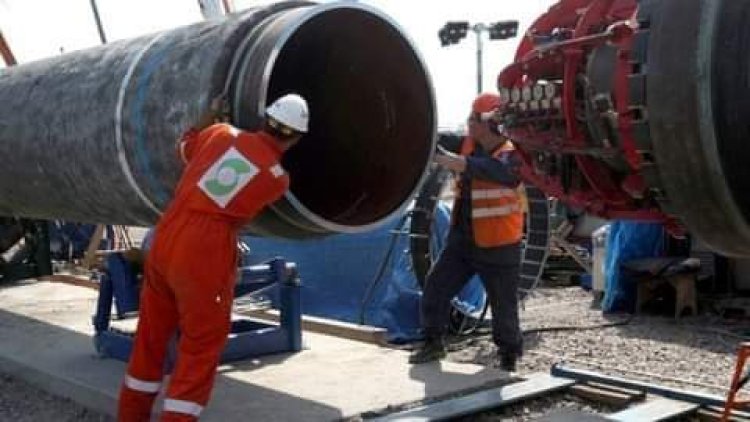EU mulls weaponising energy in Russia crisis

You know that feeling when you're running downhill, going so fast that you seem to lose control of your own feet?
That's often the sense you get in EU corridors of power at the moment.
- UPDATE: Don’t Transfer Us To Prison, DCP Kyari, Others Beg Court
- Sanusi: Nigerians Manipulate Religion To Cover The Truth
Crushing financial sanctions on Russia that hurt European business.
Brussels purchasing and sending weapons to a non-EU country at war.
Germany beefing up its military, despite post-World War Two queasiness. Staunchly neutral Finland and Sweden thinking of joining Nato.
The bloc's asylum procedure pushed aside to accommodate fleeing Ukrainians, in what's described as Europe's biggest refugee crisis since 1945.
Once dismissed as impossible - or at least, hugely improbable - from one day to the next, EU revolutions, provoked by the Russia-Ukraine crisis, have been happening thick and fast.
The next seismic change bubbling in Brussels? A looming energy revolution, provoked by a simple question: What's the point of punitive financial sanctions if Vladimir Putin's war chest is refilled on a daily basis with oil and gas revenues?
The EU depends on Russia for 40% of its natural gas and a quarter of its oil imports.
EU countries pay about €1bn a day to Moscow for those supplies, according to Bruegel, the Brussels-based think tank.
The US - which is far less reliant on Russian energy supplies than Europe - says it's considering banning Russian oil imports as part of its sanctions against the Kremlin.
On Monday, standing next to US Secretary of State Antony Blinken, Lithuania's foreign minister agreed. "We cannot pay for oil and gas with Ukrainian blood," he said.
Price woes and the electorate
Along with other eastern European Nato and EU members, Lithuania views Vladimir Putin - with his ambitions to change Europe's geopolitical order in Moscow's favour - as an active security threat.
The West must fight Russia "with all means available", said Lithuania's president. "To avoid World War Three."
But other EU countries, such as big powers Germany and Italy - far more reliant on Russian energies than most - feel more threatened by the prospect of skyrocketing energy prices that would surely follow any sanctions on Russian oil or gas imports.
Energy prices are already painfully high across the continent.
Until Russia's attacks on Ukraine, the majority of Germans supported Nord Stream 2, their new gas pipeline direct from Russia.
The pipeline has been frozen as part of EU sanctions against Russia, but Berlin fears public opinion could turn if Germans suddenly can't fill their cars with petrol or afford to heat their homes.
Germany's Federation of Industries, the BDI, has warned that soaring prices could crush the EU's largest economy, forcing factory and other German business closures, with a rippling effect across the single market.
France's Emmanuel Macron is nervous too. He hopes to be re-elected president next month.
The last time he was blamed for petrol price hikes in France, it sparked months of massive street protests by the "gilets jaunes", the yellow jackets, so-called because of the high-visibility vests they wore.
So, while on the world stage, President Macron presents himself as the European champion of carbon neutrality, energy prices are such a sensitive issue in France that he introduced €100 bonuses for the poorest voters this winter, to mitigate fossil fuel prices as part of his re-election bid.
It's notable, too, that French energy giant Total says it's staying put in Russia for now, despite the Kremlin's onslaught against Ukraine, while competitors BP and Shell have voluntarily pulled out.
Ukraine needs EU action now
So are energy sanctions against Russia just the latest example of an "EU impossible" that will suddenly become reality?
The issue will be discussed in the European Parliament on Tuesday and among EU leaders at their Thursday summit.
When I speak to EU naysayers, they talk defensively, not only about the dangers of domestic blowback, but also potential aftershocks in the global energy market.
"At the moment, we're speaking with one voice alongside Latin America, regarding Russian aggression," one diplomat told me.
"But what would happen if the Argentine economy implodes as a result of energy price hikes and scarcity and the EU and the West is blamed for that?"
So for the moment, the EU is clinging to what it views as safer ground.
On Monday, EU Commission chief Ursula von der Leyen said the bloc would be speeding up efforts to wean itself off Russian energy.
These include:
finding "reliable" alternative suppliers (such as Qatar and Azerbaijan)
improving energy efficiency, eg renovating buildings and using artificial intelligence to effectively manage the energy grid
"massive investment" in renewables such as solar, wind and hydrogen, already planned under the European Green Deal.
Russia's actions in Ukraine mean Brussels now views the Climate Question as a question of security. Energy security.
Germany's new chancellor took the world's breath away a week ago by reversing his country's defence policy, sending weapons to Ukraine and announcing a €1bn investment in the German military.
His finance minister has also announced a €2bn investment in renewable and alternative energy sources. Germany's need is acute, as it has all but phased out nuclear energy, as well as phasing out coal.
But those plans for renewable energies, alternative suppliers and a clean energy divorce from Russia will take time.
Something Ukraine just does not have.
Source: BBC


















































